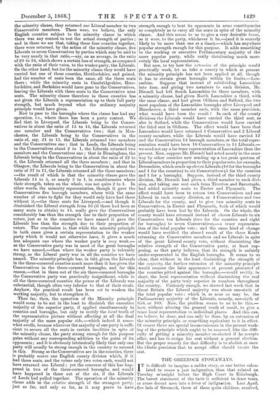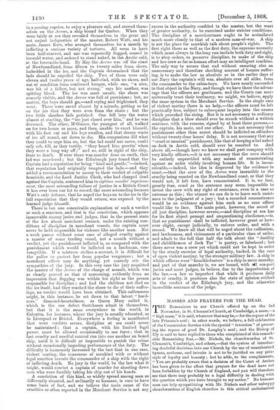THE GREENOCK STOWAWAYS.
IT is difficult to imagine a sadder story, or one better calcu- lated to rouse a just indignation, than that related on Tuesday se'nnight before the High Court in Edinburgh. The barest statement of the facts is sufficient to draw tears, or rouse decent men into a fever of indignation. Last April, five lads of Greenock, three of them quite children, resolved, in a passing caprice, to enjoy a pleasure sail, and stowed them- selves on the Arran, a ship bound for Quebec. When they were fairly at sea they revealed themselves, to the great and not unjust indignation of the master, Robert Watt, and his mate, James Kerr, who avenged themselves for a month by inflicting a curious variety of tortures. All seem to have been half-starved, and one was repeatedly flogged, soused in ice-cold water, and ordered to stand naked, in the Arctic cold, at the forecastle-head. By May the Arran was off the coast of Newfoundland, from fifteen to twenty miles from shore, imbedded in the ice, and the Captain determined that the lads should be expelled the ship. Two of them were only eleven and twelve years of age, half-clad, with no shoes, and out of condition from continued hunger, while one, "a nice, wee bit of a fellow, but not strong," says his mother, was spitting blood. The ice was most unsafe, the shore was scarcely visible, and the Arran was full of provisions ; but, no matter, the boys should go,—and crying and frightened, they went. Three were saved almost by a miracle, getting so far on the ice that they were seen from the shore ; but the two little shoeless lads perished. One fell into the water almost at starting, the "ice just closed over him," and he was drowned. The other, M.Ginnes, the youngest of all, walked on for two hours or more, and then, unable to exert himself, with his feet cut and his legs swollen, and that dreary waste of ice all round, sat down to die. His companions did what they could to urge him on, but the lad could not move, could only sob, till, as they testify, "they heard him greetin' when they were a long way off ;" and so, still in sight of the ship, froze to death. If ever there was murder done on earth, that lad was murdered ; but the Edinburgh jury found that the Captain had a reputation for being "kind and gentle,"—indeed, that reputation had originally tempted the lads,—and they added a recommendation to mercy to their verdict of culpable homicide, and the Lord Justice Clerk, who had charged dead against the Captain, sentenced him to eighteen months' imprison- ment, the most astounding failure of justice in a British Court it has ever been our lot to record, the more astounding because Watt's only defence, that he urged the boys on to the ice in the full expectation that they would return, was exposed by the learned judge himself.
There is but one conceivable explanation of such a verdict or such a sentence, and that is the conviction, which appears immovable among juries and judges, that in the present state of the law about merchant seamen, under the existing con- ditions of discipline in merchant vessels, the captain must never be held responsible for violence like another man. Not a week passes without some case of alleged cruelty against a master of some trading vessel, not a month without a verdict, yet the punishment inflicted is, as compared with the punishment which would be inflicted on a landsman, con- temptible. If a mistress strikes a servant, it is difficult for the police to protect her from popular vengeance ; but a merchant officer may do anything, yet scarcely stir the sympathies of the jury. In this very case the jury acquitted the master of the Arran of the charge of assault, which was as clearly proved as that of marooning, evidently from an impression that flogging was within his right as the person responsible for discipline ; and had the children not died on the ice itself, had they reached the shore to die of their suffer- ings, no verdict would have been obtained. This callousness might, in this instance, be set down to that latent "hard- ness," diamond-heartedness, as Queen Mary called it, which is the one defect Scotchmen admit in themselves, but that it is the same everywhere in the world, in Calcutta, for instance, where the jury is usually educated, as in Liverpool or Bristol. Everywhere a feeling is manifested that were verdicts severe, discipline at sea could never be maintained ; that a captain, with his limited legal power, must be allowed occasionally to use force ; that in fact cruelty and needful control run into one another on board ship, until it is difficult or impossible to punish the crime without occasionally impeding performance of the duty. The difficulty is immensely increased by the fact that in one case, violent mutiny, the consensus of mankind with or without legal sanction invests the commander of a ship with the right of inflicting death. No jury in the world, be the law what it might, would convict a captain of murder for shooting down men who were forcibly taking his ship out of his bands. A conviction of this kind, so widely spread among men so differently situated, and ordinarily so humane, is sure to have some basis of fact, and we believe the main cause of the cruelties so often reported in the Merchant Service is not any excess in the authority confided to the master, but the want of greater authority, to be exercised under stricter conditions. The discipline of a merchantman ought to be assimilated much more closely to that of a modern man-of-war. A ship is not the place for mawkish talk about people's rights. The first right there as well as the first duty, the supreme necessity which must always in the long run include both duty and right, is to obey orders, to preserve discipline, to make of the ship and her crew as far as human effort may an intelligent machine. The only way to secure that end without ensuring also an unnecessary and therefore shocking amount of human suffer- ing, is to make the law as absolute as in the earlier days of our Navy the captain's will was, absolute over all alike, from the commander to the cabin-boys. We have nearly succeeded in that object in the Navy, and though we have there the advan- tage that the officers are gentlemen, and the Courts can more universally trust their testimony, we might, we believe, apply the same system in the Merchant Service. In the single case of violent mutiny there is no help,—the officers must be left practically free, subject to subsequent inquiry into the causes which provoked the rising. But it is not necessary to ordinary discipline that a blow should ever be struck without a written sentence, with the reasons, signed by at least three persons,— the captain, his mate, and one other. It is not necessary that punishment other than arrest should be inflicted on offenders without twenty-four hours' delay. It is not necessary that any "cruel or unusual" punishment, like that of keeping a lad naked on deck in Arctic cold, should ever be resorted to. And above all,—though here we know we shall part company with very kindly officers,—it is not necessary that the crew should be entirely unprovided with any means of remonstrating against an order visibly involving human life. It is incon- ceivable,—indeed, the idea is disproved by the evidence in court,—that the crew of the Arran were insensible to the cruelty being enacted on the Newfoundland coast, or that they would not, if left free, have remonstrated. It is, we fear, greatly fear, cruel as the sentence may seem, impossible to invest the crew with any right of resistance, even in a case so extreme as this ; the utmost we can do is to leave such resist- ance to the judgment of a jury ; but a recorded remonstrance would be an evidence against him such as no sane officer would like to face. The main point, however, the secret of all just discipline, however severe,—and discipline at sea has for its first object prompt and unquestioning obedience,—is, that no punishment shall be indicted, however great or how- ever slight, except judicially, to enforce order, and with a record. We know all that will be urged about the ruffianism, and lawlessness, and viciousness of a particular class of sailor, and admit to the full that half the talk about the "docility and childlikeness of Jack Tar" is poetry, or falsehood ; but there never was a crew yet which could not be kept in order by the steady exercise of legal authority, backed, in the case of open violent mutiny, by the stronger military law. A ship in which officers wear "knuckledusters " is a ship in mere anarchy, and part of that anarchy is, we are bound, with all sea-port juries and most judges, to believe, due to the imperfection of the law,—a law so imperfect that while it produces daily acts of cruelty, it produces also the state of opinion evident in the verdict of the Edinburgh jury, and the otherwise incredible sentence of the judge.



































 Previous page
Previous page